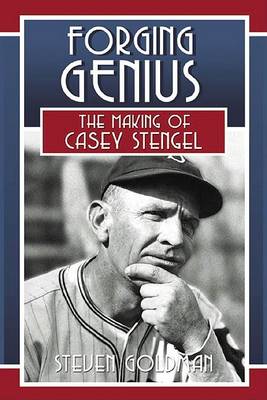When Casey Stengel was named the manager of the Yankees in 1949, baseball wags were stunned. What had Stengel ever done? His work managing the Brooklyn Dodgers and Boston Braves had been long on personality and remarkably short on success. They thought the Yankees would never be able to compete with the Red Sox or Indians with that broken-down old man in charge. At the All-Star break, the Yankees looked like a banged-up bunch of also-rans, not like a team about to embark on five straight championships. Yet Stengel seemed confident of success. As Steven Goldman explains, people had forgotten that Casey knew how to come back. How did he know? Goldman refutes claims that anyone could have won with the Yankees. Casey knew how to win because of the years of struggle and ignominy, because he'd learned how to manage by running two of the game's worst sad-sack franchises, because he had learned through failure. To understand Stengel's formative years, Goldman retraces Stengel's baseball education in playing for the great John McGraw, from whom he also learned that success permits no room for nostalgia.
Goldman follows Stengel through his years with the Dodgers and Braves, his return to the minors, a spat with Bill Veeck, and his success as a businessman away from the diamond. Forging Genius gives insights to Stengel's irrepressible love of the game and his incorrigible desire to entertain. As Casey put it, "Because I can make people laugh, some of them think I'm a damn fool." His humor camouflaged a relentless hunger for success, glory, and the respectability he desperately sought. Goldman gives readers an unprecedented vision of one man's lifelong pursuit of genius on the baseball diamond. From The Introduction Of Forging Genius Today, over forty years after the era of his greatest triumphs ended, Casey Stengel is remembered as the manager of the New York Yankees dynasty of 1949 to 1960, the greatest sustained success in baseball history. Stengel's Yankees won ten pennants in his twelve seasons as manager, an unprecedented run which will probably never be equaled (though the record of Bobby Cox's Atlanta Braves from 1991 to 2003 is, in a lower-case way, as impressive).
Given his many ostensible failures as a manager prior to his fifty-ninth year, Stengel's achievements afterwards seemed to many observers unexpected and unearned. Yet it was those moments of failure and rejection, that hold the key to understanding the man and his achievements - he was forged by the journey, not the arrival. The seeds of the Yankees championships were planted during the years that Stengel was believed to have wasted. Stengel's greatest asset was his resiliency. In his 1964 book, The Quality of Courage, Mickey Mantle, Stengel's protege and intended monument, wrote, in a chapter titled "Casey Never Quit," (or perhaps dictated to his ghost, Robert Creamer): He had a terrible managerial record [before joining the Yankees]...But people forget that after Casey hit.223 at Maysville one year he led his league in batting the next. They forgot that after he was traded for a seventh-place club to an eight-place club, he was traded to a pennant-winner and starred in two World Series. They forgot that after looking all washed up, he batted.368 and.339 in successive seasons. They forgot that Casey knew how to come back. [...]
Stengel not only returned from his setbacks but advanced himself each time, winning world championships and eventually transcending the narrow definition of success versus failure that is games won and lost. Fred Lieb, who covered the manager in every decade of his long career, wrote that with the exception of Babe Ruth, Stengel was the most widely known and best loved man in baseball. Whitey Herzog said that he was the best ambassador baseball ever had. Baseball, he wrote, is like physics. "The field is ruled by properties you can't see, but those properties make everything happen that you can see. Only the best teachers know the laws and have the sense to make them clear to the young and the brainless. In Casey, I had an Einstein."
- ISBN10 1574888730
- ISBN13 9781574888737
- Publish Date 17 May 2005
- Publish Status Out of Print
- Out of Print 29 June 2010
- Publish Country US
- Publisher Potomac Books Inc
- Imprint Brassey's US
- Format Hardcover
- Pages 288
- Language English
